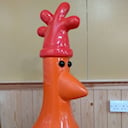Which is an absurd or contradictory statement which when investigated may prove to be true?
A paradox is a statement that, despite apparently valid reasoning from true premises, leads to an apparently-self-contradictory or logically unacceptable conclusion. A paradox involves contradictory-yet-interrelated elements that exist simultaneously and persist over time.
Some logical paradoxes are known to be invalid arguments but are still valuable in promoting critical thinking.
Some paradoxes have revealed errors in definitions assumed to be rigorous, and have caused axioms of mathematics and logic to be re-examined. One example is Russell's paradox, which questions whether a "list of all lists that do not contain themselves" would include itself, and showed that attempts to found set theory on the identification of sets with properties or predicates were flawed. Others, such as Curry's paradox, are not yet resolved.
Examples outside logic include the ship of Theseus from philosophy (questioning whether a ship repaired over time by replacing each and all of its wooden parts, one at a time, would remain the same ship). Paradoxes can also take the form of images or other media. For example, M.C. Escher featured perspective-based paradoxes in many of his drawings, with walls that are regarded as floors from other points of view, and staircases that appear to climb endlessly.
More Info:
en.wikipedia.org







